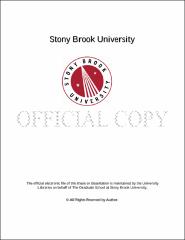| dc.identifier.uri | http://hdl.handle.net/1951/60230 | |
| dc.identifier.uri | http://hdl.handle.net/11401/71497 | |
| dc.description.sponsorship | This work is sponsored by the Stony Brook University Graduate School in compliance with the requirements for completion of degree. | en_US |
| dc.format | Monograph | |
| dc.format.medium | Electronic Resource | en_US |
| dc.language.iso | en_US | |
| dc.publisher | The Graduate School, Stony Brook University: Stony Brook, NY. | |
| dc.type | Dissertation | |
| dcterms.abstract | Cancer cells preferentially metabolize glucose by aerobic glycolysis, characterized by increased lactate production. This distinctive metabolism involves expression of the embryonic M2 isozyme of pyruvate kinase, in contrast to the M1 isozyme normally expressed in differentiated cells, and it confers a proliferative advantage to tumor cells. The M1 and M2 pyruvate kinase isozymes are expressed from a single gene through alternative splicing of a pair of mutually exclusive exons. We measured the expression of M1 and M2 mRNA and protein isoforms in mouse and human tissues, tumor cell lines, and during terminal differentiation of muscle cells,and showed that alternative splicing regulation is sufficient to account for the levels of expressed protein isoforms. We further showed that the M1å©specific exon is actively repressed in cancer cell linesåà å»although some M1 mRNA is expressed in cell lines derived from brain tumorsåà å»and demonstrated that the related splicing repressors hnRNPA1 and A2, as well as the polypyrimidine tract binding protein PTB, contribute to this control. Down regulation of these splicing repressors in cancer cell lines using shRNAs rescues M1 isoform expression and decreases the extent of lactate production. We further identified the oncogenic SR protein SRSF3 as a regulator that recognizes an exonic splicing enhancer to activate exon 10 and mediate changes in glucose metabolism. To systematically detect additional splicing factors that promote PKM1 expression, I carried out a directed, highå©throughput lentivirus screen using a novel qPCR approach. Using this approach, I identified additional players that may participate in the tissue specific regulation of alternative splicing of PKM. These findings extend the links between alternative splicing and cancer, and begin to define some of the factors responsible for the switch to aerobic glycolysis. | |
| dcterms.abstract | Cancer cells preferentially metabolize glucose by aerobic glycolysis, characterized by increased lactate production. This distinctive metabolism involves expression of the embryonic M2 isozyme of pyruvate kinase, in contrast to the M1 isozyme normally expressed in differentiated cells, and it confers a proliferative advantage to tumor cells. The M1 and M2 pyruvate kinase isozymes are expressed from a single gene through alternative splicing of a pair of mutually exclusive exons. We measured the expression of M1 and M2 mRNA and protein isoforms in mouse and human tissues, tumor cell lines, and during terminal differentiation of muscle cells,and showed that alternative splicing regulation is sufficient to account for the levels of expressed protein isoforms. We further showed that the M1å©specific exon is actively repressed in cancer cell linesåÁå»although some M1 mRNA is expressed in cell lines derived from brain tumorsåÁå»and demonstrated that the related splicing repressors hnRNPA1 and A2, as well as the polypyrimidine tract binding protein PTB, contribute to this control. Down regulation of these splicing repressors in cancer cell lines using shRNAs rescues M1 isoform expression and decreases the extent of lactate production. We further identified the oncogenic SR protein SRSF3 as a regulator that recognizes an exonic splicing enhancer to activate exon 10 and mediate changes in glucose metabolism. To systematically detect additional splicing factors that promote PKM1 expression, I carried out a directed, highå©throughput lentivirus screen using a novel qPCR approach. Using this approach, I identified additional players that may participate in the tissue specific regulation of alternative splicing of PKM. These findings extend the links between alternative splicing and cancer, and begin to define some of the factors responsible for the switch to aerobic glycolysis. | |
| dcterms.available | 2013-05-24T16:38:16Z | |
| dcterms.available | 2015-04-24T14:47:45Z | |
| dcterms.contributor | Tonks, Nicholas | en_US |
| dcterms.contributor | Krainer, Adrian | en_US |
| dcterms.contributor | Spector, David Sordella, Raffaella | en_US |
| dcterms.contributor | Cartegni, Luca | en_US |
| dcterms.creator | Chatterjee, Deblina | |
| dcterms.dateAccepted | 2013-05-24T16:38:16Z | |
| dcterms.dateAccepted | 2015-04-24T14:47:45Z | |
| dcterms.dateSubmitted | 2013-05-24T16:38:16Z | |
| dcterms.dateSubmitted | 2015-04-24T14:47:45Z | |
| dcterms.description | Department of Molecular and Cellular Biology | en_US |
| dcterms.extent | 214 pg. | en_US |
| dcterms.format | Monograph | |
| dcterms.format | Application/PDF | en_US |
| dcterms.identifier | http://hdl.handle.net/1951/60230 | |
| dcterms.identifier | http://hdl.handle.net/11401/71497 | |
| dcterms.issued | 2012-08-01 | |
| dcterms.language | en_US | |
| dcterms.provenance | Made available in DSpace on 2013-05-24T16:38:16Z (GMT). No. of bitstreams: 1
StonyBrookUniversityETDPageEmbargo_20130517082608_116839.pdf: 41286 bytes, checksum: 425a156df10bbe213bfdf4d175026e82 (MD5)
Previous issue date: 1 | en |
| dcterms.provenance | Made available in DSpace on 2015-04-24T14:47:45Z (GMT). No. of bitstreams: 3
StonyBrookUniversityETDPageEmbargo_20130517082608_116839.pdf.jpg: 1934 bytes, checksum: c116f0e1e7be19420106a88253e31f2e (MD5)
StonyBrookUniversityETDPageEmbargo_20130517082608_116839.pdf.txt: 336 bytes, checksum: 84c0f8f99f2b4ae66b3cc3ade09ad2e9 (MD5)
StonyBrookUniversityETDPageEmbargo_20130517082608_116839.pdf: 41286 bytes, checksum: 425a156df10bbe213bfdf4d175026e82 (MD5)
Previous issue date: 1 | en |
| dcterms.publisher | The Graduate School, Stony Brook University: Stony Brook, NY. | |
| dcterms.subject | Molecular biology à Cellular biology | |
| dcterms.subject | Molecular biology Ð Cellular biology | |
| dcterms.title | Role of Alternative Splicing in Regulating Cancer Cell Metabolism | |
| dcterms.type | Dissertation | |

